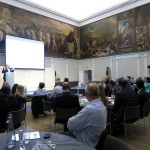 Yesterday I attended the 3rd Smartworking Summit of 2014, put on by Quora Consulting at the RSA in London. The events try and position themselves at the confluence of various strands of the future of work movement, taking in a bit of facilities management, a bit of HR, a bit of technology and so on. The speakers at the event covered each of these strands, and provided an interesting range of perspectives on how work is evolving.
Yesterday I attended the 3rd Smartworking Summit of 2014, put on by Quora Consulting at the RSA in London. The events try and position themselves at the confluence of various strands of the future of work movement, taking in a bit of facilities management, a bit of HR, a bit of technology and so on. The speakers at the event covered each of these strands, and provided an interesting range of perspectives on how work is evolving.
Rise of the generalist
Caroline Waters for instance, recalled her time at BT and how the workplace has evolved in her 30 or so years at the company. A number of salient points emerged from her presentation, such as the crucial role flexible working played in attracting the talent required by the company to thrive.
She also spoke about the importance of collaboration in the workplace, especially as we increasingly work in an environment whereby one person is unlikely to have the answers, so it’s likely to require a collective effort. In a further nod to the generalist, Waters also highlighted the importance of having cross-departmental knowledge when it comes to enacting change. This is something I touched upon in a recent post, which discussed research into the importance of organizational knowledge.
The importance of mindset
As I’ve been doing some work with the NHS recently, I was keen to hear what Chris Mellor had to say. An experienced executive, he’s currently chairman of Peterborough NHS Steering Group, and has had a few roles heading up various trusts. He comes with a bit of a history, having been sacked as a board member at Northern Ireland Water in 2011. Alas, he has a reputation as strong on change. One thing he mentioned that did strike a chord was his belief that most executives are starved of candid feedback. This is something I’ve touched on many times on this blog, and feedback is crucial to support the sense and respond organization we’re all trying to build.
Less promising however was his opinion on changing behaviours. He came across as someone rather entrenched in the fixed mindset that people cannot really change their ways, nor indeed that their environment has any impact upon their behaviours. If you want to change, you have to change your people (as in literally change them for people with your approach). It’s an approach I don’t really agree with, and he created an impression of being quite old school and top down in his thinking.
At the opposite end of the spectrum completely was Microsoft’s Dave Coplin. Dave is Microsoft’s Chief Envisioning Officer (or some such), and the author of The Rise of Humans (which I reviewed earlier this summer). As someone reasonably well versed in this general area, the subject matter of his talk was nothing especially new, and his broad theme of using technology to help us rather than becoming enslaved by it is one that has been touched on extensively by people such as Andrew McAfee and Jared Lanier. Nevertheless, his boundless enthusiasm and energetic delivery was very effective, and certainly got the message across to the audience well.
I’ve written previously about the need for the various approaches to the whole ‘future of work’ thing to come together and work more effectively in unison, and the Smartworking Summits are one of the few attempts to really do that. That makes them an event worth attending in my opinion.